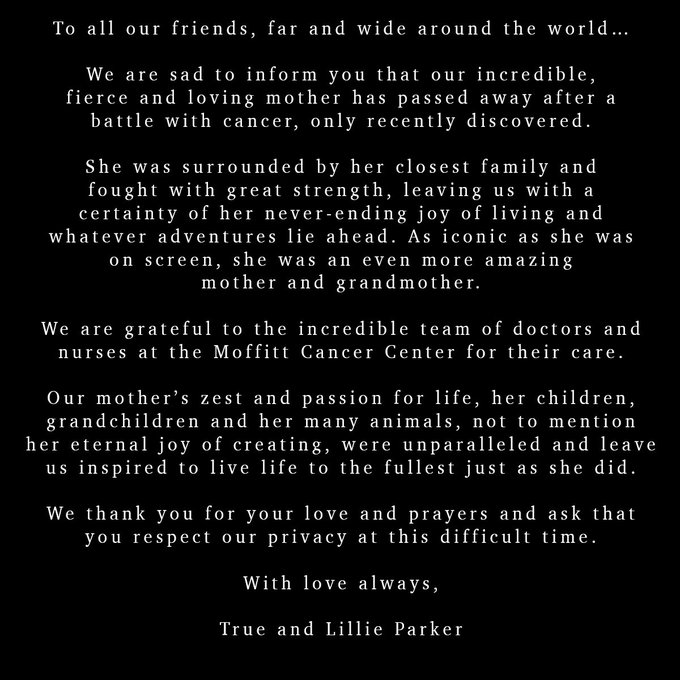
Getty Kirstie Alley's cause of death is cancer.
Kirstie Alley is dead at the age of 71. Alley’s family said in a statement posted to her Twitter account on December 5, 2022, that the “Cheers” star’s cause of death was cancer. She died after a brief battle with the disease, her children wrote in the tweet.
According to TMZ, it was a “private battle” with cancer. The family’s statement did not explain the form of cancer that Alley had been fighting, but People Magazine later reported that Alley was diagnosed with colon cancer.
Here’s what you need to know about Kirstie Alley’s death:
Alley’s Cancer Was ‘Only Recently Discovered’
Alley’s children released the statement on her Twitter page, saying the cancer was “only recently discovered.” Her son, True, and daughter, Lillie wrote in the statement, “To all our friends, far and wide around the world. … We are sad to inform you that our incredible, fierce and loving mother has passed away after a battle with cancer, only recently discovered.”
Her kids added, “She was surrounded by her closest family and fought with great strength, leaving us with a certainty of her never-ending joy of living and whatever adventures lie ahead. As iconic as she was on screen, she was an even more amazing mother and grandmother.”
The statement continued:
We are grateful to the incredible team of doctors and nurses at the Moffitt Cancer Center for their care. Our mother’s zest and passion for life, her children, grandchildren and her many animals not to mention her eternal joy of creating, were unparalleled and leave us inspired to live life to the fullest just as she did. We thank you for your love and prayers and ask that you respect our privacy at this difficult time.
Moffitt Cancer Center is located in Tampa, Florida, near where Alley lived, in Clearwater. According to the Tampa Bay Times, Alley, a Kansas native, moved to Florida in 2000.
According to Closer Weekly, Kirstie Alley adopted the two children – Lillie Price Stevenson and William True Stevenson, with her ex-husband Parker Stevenson. They adopted the children after she suffered a miscarriage in 1994.
In 2016, she announced on social media that she was a grandmother. “When your son has a son…bliss…yes this is my secret happy news as promised …Welcome Waylon Tripp Parker,” she tweeted.
Alley was still actively tweeting on Thanksgiving Day, wishing her fans a happy holiday.
Colon Cancer Kills Thousands of People Each Year
According to the U.S. Centers for Disease Control and Prevention, “Not counting some kinds of skin cancer, colorectal cancer is the fourth most common cancer in men and women. It is the fourth leading cause of cancer-related deaths in the United States.” More than 51,000 deaths caused by colorectal cancer were reported in 2019, according to the CDC.
The CDC adds, “Of cancers that affect both men and women, colorectal cancer is the second leading cancer killer in the United States, but it doesn’t have to be. Colorectal cancer screening saves lives. Screening can find precancerous polyps—abnormal growths in the colon or rectum—that can be removed before they turn into cancer. Screening also helps find colorectal cancer at an early stage, when treatment works best. About nine out of every 10 people whose colorectal cancers are found early and treated appropriately are still alive five years later.”
The CDC recommends people over 45 to get screened for colorectal cancer. See the symptoms of colorectal cancer here.
According to the American Cancer Society, “Research is always going on in the area of colorectal cancer. Scientists are looking for causes and ways to prevent colorectal cancer, better ways to find it early (when it’s small and easier to treat), and ways to improve treatments. … Doctors are looking for better ways to find colorectal cancer early by studying new types of screening tests (like blood tests) and improving the ones already being used.
The American Cancer Society adds, “Researchers are also trying to figure out if there’s any test or screening plan that clearly works best. They’re also looking for ways to educate and encourage people to get the routine screening tests that are available today and known to help reduce the number of deaths from this cancer.”
strong>READ NEXT: The University of Idaho Students Who Were Murdered in Moscow, Idaho

Comments
Kirstie Alley Cause of Death: How Did ‘Cheers’ Star Die?